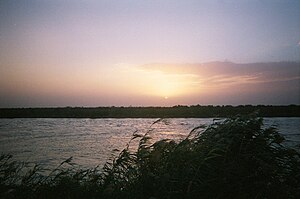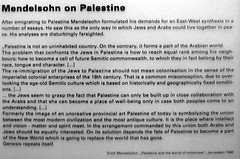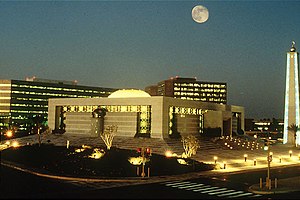Past, Present and Future of Cradle of Civilizations (9)
A direct result and impact of WW1 in the Middle East region was the collapse of the Ottoman Empire, and the creation of what is called Modern Middle East. However the result of such Middle East proved to be also the creation of new and major conflicts in the region.
The League of Nations granted Class A mandates for the French Mandate of Syria and Lebanon and British Mandate of Mesopotamia and Palestine.
Parts of the Ottoman Empire on the Arabian Peninsula became what is today Saudi Arabia and Yemen.
 Image via Wikipedia
Image via WikipediaIn September 1939, after Britain and France declared war on Germany following its invasion to Poland, the German Forces crossed Maginot Line and pushed deep into France. Italy joined Germany and declared war on France. The French government fled to Bordeaux and Paris was occupied on June 14, the same year.
France then was divided into a German occupation Zone in the North and West and Italian occupation in the southeast, with a free Zone in the south.
Metropolitan France remained under Axis occupation and ruled by a rump state called Vichy France.
The Allies, after France fell under Germany, rushed to prevent the Nazis from using Vichy French-controlled Mandate of Syria and Mandate of Lebanon as springboards for attacks on the Allied stronghold of Egypt. They fought a major campaign against Axis forces further west, in North Africa.
Although the French had ceded autonomy to Syria in September 1936, they had retained treaty rights to maintain armed forces and to maintain two airfields in the territory
The Germans requested permission from the Vichy authorities to use Syrian railways to send armaments to Iraqi rebels in Mosul. The Allies considered the support of Axis for anti-British parties in Iraq as a real threat, thus endangering strategic oil supplies and communications.
The Mediterranean Sea was a traditional focus of British maritime power, and the Mediterranean Fleet was Britain's instrument of this maritime power.
Allied forces in reserve called for reinforcements from their forces in the region, including their Brigades and infantry battalions that were positioned in Central Europe. In mid-June, those reinforcements came into the line, mainly on the Damascus front.
The Allied planned four lines of attacks:
On Damascus from Palestine.
On Beirut from Palestine.
On northern Syria from Iraq,
On Palmyra (in central Syria) and Tripoli from Iraq.
The 5th Indian Brigade Group ordered to cross the Syrian border from Palestine and take Quneitra and Deraa.
It was anticipated that this would open the way for the 1st Free French Division forces to advance to Damascus. Four days after the commencement of the operation, this force was bought under unified command and was named Gentforce after its French commander, Major-General Paul Louis Le Gentilhomme.
The operation was also to include a supporting commando landing from Cyprus at the south of the Litani River.
Once the two southern prongs were well engaged, it was planned that a third force, comprising formations drawn from Iraq Command, would attack Syria from Iraq.
 Image via WikipediaAllied Forces were to advance the Euphrates River from Haditha in Iraq (upstream from Baghdad) toward Deir el Zor and thence to Raqqa and Aleppo to threaten the communication and supply lines of the Vichy forces mainly the railway line running northwards through Aleppo to Turkey (at the time, Turkey was thought by some to be sympathetic to the Vichy government and to Germany).
Image via WikipediaAllied Forces were to advance the Euphrates River from Haditha in Iraq (upstream from Baghdad) toward Deir el Zor and thence to Raqqa and Aleppo to threaten the communication and supply lines of the Vichy forces mainly the railway line running northwards through Aleppo to Turkey (at the time, Turkey was thought by some to be sympathetic to the Vichy government and to Germany).The plan also was to capture all the territory in north-east Syria, and make a link between Aleppo and Baghdad via Mosul.
A Habforce would gather in western Iraq between Rutbah and the Transjordan border, to secure the oil pipeline from Haditha to Tripoli.
The relations between the United Kingdom and the French Vichy government were difficult but hardened more after the Royal Navy sank French ships in Alegeria in 1940.
When In June 1941, a revolt in Iraq was put off by British forces, Britain then had unlimited rights to station and transit troops through Iraq. And in a move that displaced disapproval of Vichy government, of the British policy in Iraq, the French base in the Syrian Mandate gave some assistance to pro-Axi nationalists and even to the Germans by providing stages basis for the German aircraft that launched an attack on the British Forces in Iraq.
This had led the Royal Air Forces to attack French air basis in Syria, and that was followed by a full scale invasion of Vichy-occupied Syria and Lebanon during the Syria-Lebanon Campaign.
In 1942 British Forces invaded Syria, Lebanon and Persia.
Fearing the Germans would attack the area through Turkey or via Cyprus into Lebanon or launching a full scale war in Egypt,
 Image via WikipediaIn 1940 Italian Dictator Mussolini stationed his forces in Libya to invade into the British held Egypt, however Allies Forces defeated them. Hitler sent his army to North Africa in early 1941 and took Tobruk a border town between Libya and Egypt, under the command of General Rommel, who managed to push the British forces back to Egypt.
Image via WikipediaIn 1940 Italian Dictator Mussolini stationed his forces in Libya to invade into the British held Egypt, however Allies Forces defeated them. Hitler sent his army to North Africa in early 1941 and took Tobruk a border town between Libya and Egypt, under the command of General Rommel, who managed to push the British forces back to Egypt.The British General Bernard Montgomery was able to stop Rommel's forces, with the support of the British Forces in Malta, who cut Rommel's supply lines at sea, but he failed to keep the city of Alamein position that he took shortly before.
With the defeat of Hitler in Egypt, the Germans lost to achieve a strategic goal to slice through Egypt, capture Suez Canal, enter the British Mandate of Palestine, activate an Arab uprising against the British and link up with German forces thrusting south from Russia. The Vichy French forces, who were Nazi's allies, controlled Algeria to the west and Syria to the north of Palestine.
After World War 2, demands for independence from people across the Middle East increased, and the oil discovery made the geographic location of this part of the world tremendously important to the Superpowers, mainly USA and USSR who both had extremely opposite ideologies and strategies, and both wanted strong footholds to influence and protect their interests.
 Image by ЯAFIK ♋ BERLIN via FlickrWhen the Jews pushed their demands for a homeland and shelter for the Holocaust survivors, the 1947 UN divided Palestine into two separate Jewish and Arab states, that led to a series of wars between Arabs and Israel.
Image by ЯAFIK ♋ BERLIN via FlickrWhen the Jews pushed their demands for a homeland and shelter for the Holocaust survivors, the 1947 UN divided Palestine into two separate Jewish and Arab states, that led to a series of wars between Arabs and Israel.Later Israel held more lands, took Jerusalem and forced around 1 Million Palestinians to flee their homes and homeland.
More Jews from all over the world arrived to settle in their new country.
More Arab Nations were given their independence, but remained under regimes that are controlled by the occupiers mainly France and Britain.
President Nasser of Egypt called for Pan-Arabism, and nationalized Canal Suez in 1956, causing a very painful hit to Britain, which was benefiting still from the Canal revenues.
England, France and the new country of Israel, launched a fierce war against Egypt in an attempt to retake Suez Canal.
 Image via WikipediaHowever under brave resistance of Nasser's army and the Egyptian people, and under heavy pressure from USA (which was emerging a strongest power after the last 2 wars that made France and Britain and Europe in general tired and very weak), the invaders were forced to accept a ceasefire and pulled their forces from the region. Suez Canal remained an Egyptian property and under Egypt full control and management.
Image via WikipediaHowever under brave resistance of Nasser's army and the Egyptian people, and under heavy pressure from USA (which was emerging a strongest power after the last 2 wars that made France and Britain and Europe in general tired and very weak), the invaders were forced to accept a ceasefire and pulled their forces from the region. Suez Canal remained an Egyptian property and under Egypt full control and management.In Syria, France refused to ratify the 1936 Treaty, suspended elected legislature and the constitution and ceded Alexandretta to Turkey in 1939.
With the fall of France and the installation of the Vichy government, Britain decided that it cannot accept a Vichy government in Syria and Lebanon. The British Forces occupied the area, along with Free French troops, in 1941.
in Egypt, as Germans were pushing across North Africa, in 1942 British stepped in and forced the king to accept a Wafd government.
In Iraq, pro-German Rashid Ali al-Kailani launched military coup in 1942. Regent and pro-British politicians fled to Jordan. British troops from India and Palestine converged on Iraq, supported by the Trans-Jordanian Arab Legion.
After the Nazi invasion of USSR and Moscow coming in with the Allies, Iran became a key to Allied strategy. The British army invaded Iran from the south and the Soviet troops entered from the north. The US forces joined the operations and Reza Shah who was (mostly pro-German) abdicated in favor of his son Muhammad Reza.
Ruling circles around Reza Shah were mostly pro-German, so Allies militarily occupy the Allied forces stayed until the end of the war (Teheran Conference of 1943 commitment).
The Wafd government in Egypt, King Faisal in Iraq and Muhammad Reza in Iran, all served to undermine the nationalist credentials of local parties, which co-operated with the allies.
However, War represented a reversal of trend toward more local control, with reassertion of colonial power. But in many ways a last gasp, as both Britain and France are drained by the war.
France in effect lost its Middle Eastern (not North African) possessions, with Syria and Lebanon becoming independent in 1943/4.
Britain could no longer maintain its role in Turkey or Iran (formally ceded that to USA), and gave up on Palestine in 1948 and had troubles in Egypt and Iraq as their client governments fell in 1950's.
The War saw the entrance of both the USSR and U.S. into the region in a major way:
USSR worked to set up pro-Soviet local governments in the region mainly in Iran which was in a way under their control. They had the same designs for Turkey, and succeeded to inject the Communist ideologies in Egypt, Syria and Palestine and supported the Communist parties to play political roles in these countries.
USA with its troops in Iran, paid specific attention and committed more to Saudi Arabia, which was for them a strategic importance, being an oil-fields country and also a religious center to the Muslim world.
 Image via WikipediaWhen the Saudis were trapped for resources during the War, US stepped in with Lend-Lease Aid (first through Britain, then directly). As an appreciation gesture, the Saudis granted USA the right to build an airbase in the oil area of Dhahran and a military US mission arrived to train the Saudi armed forces.
Image via WikipediaWhen the Saudis were trapped for resources during the War, US stepped in with Lend-Lease Aid (first through Britain, then directly). As an appreciation gesture, the Saudis granted USA the right to build an airbase in the oil area of Dhahran and a military US mission arrived to train the Saudi armed forces. Oil started flowing from Saudi Arabia immediately after the War, and US role grew tremendously and rapidly.
Under terms of Teheran Declaration of 1943, US, UK and USSR must evacuate Iran within 6 months after the war was ended.
USA and UK did, but Soviets remained, helping to set up pro-Communist regional governments in Azerbaijan and Iranian Kurdistan. Iran raised the issue at the new United Nations Security Council; however The US made strong but private representations to the Soviet government calling for a Soviet withdrawal.
The Iranian government offered USSR oil concessions in the northern part of the country in an attempt to make them leave the country. The Soviets accepted and withdrew, but the Iranian parliament refused to ratify the oil concession.
USA began limited military and economic aid to Iran in 1949.
The stand off between USA and USSR started in the region and the cold war began between the two powers.
At the conclusion of the War, USSR demanded territorial concessions from Turkey; a Soviet base in Turkish Straits and revision of the Montreaux Convention and the international agreement governing the Straits.
Soviet diplomatic pressure on Turkey through 1946 coupled with agitation by pro-Communist forces in Turkey.
Britain informed USA that it could not offer military support to Turkey if the crisis escalated, and Greece was engaged in a civil war.
March 1947, the US President Truman announced the “Truman Doctrine” of support to countries threatened by Communism. He offered $100 million in military aid to Turkey immediately, much more followed. In May 1947 US fleet visited Istanbul and in 1951 Turkey joined NATO.
Coming on heals of Azerbaijan crisis, US increasingly involved in defense commitments to Middle Eastern countries bordering the Soviet Union.
In wake of 50-50 deal for Saudi, Iran pushed for a similar deal with British Petroleum,
but the British government was not in a position to subsidize such a deal and BP refused the offer.
The National Front group in Iranian parliament, headed by Qajar noble Muhammad Mossadeq, pushed for nationalization of the oil industry. Parliament passed a nationalization law in 1951, and Mossadeq was appointed prime minister by a reluctant Shah. BP persuaded other oil companies not to buy oil from Iran, enforcing an effective boycott on Iranian oil. Other oil producers increased production. With increasingly difficult economic situation and pressing political unrest, Mossadeq and the Shah struggled over control of policy and the military, and looked to the Tudeh (Communist) Party of Iran for support.
Truman Administration had urged the British to find some accommodation between BP and Iran, to avoid crisis. With new Eisenhower Administration, there was more willingness for USA to get directly involved, alleging that Mossadeq was increasingly in league with Communist forces.
In league with British secret service (MI6), CIA worked with Iranian officers loyal to the Shah to depose Mossadeq in 1953. The plot almost went awry, as Mossadeq refused to accept the Shah’s order of his dismissal, and the Shah left the country. Units of the military were mobilized under US and British plans; along with street mobs mobilized out of mosques by religious leaders who feared the growth of Communist power in the country. Eventually the royalist forces gained control of Teheran, Mossadeq was arrested and the Shah returned to the capital. The US military and civilian aids increased to Iran, and Iran became a centerpiece of US Cold War strategy.
As those events were unfolding, in another area of the Middle East the decline of British imperial power was creating a new crisis, in which the United States, the Soviet Union and all the regional powers were becoming enmeshed.
Those events in the Middle East region, which happened before and after WW2, can give more lights on what is going on presently in the region.
The Regimes that were left to govern the countries in the Middle East, contributed fully in bringing the West another time to control the region.
Why and on what grounds the West is struggling to directly dominate the region again.
However the West, remains only a term; there is even more hidden struggles between the Western countries on how to dominate the region.
A look on post WW2 events, explains somehow why Russia is opposing all West’s policy and roles in Syria, Iraq, Lebanon, Iran, Palestine, Egypt and Yemen.
A glance on Arab and Iranian regimes after WW2 will give more lights.
This is what we will try to do in the next article.
Sami Cherkaoui
